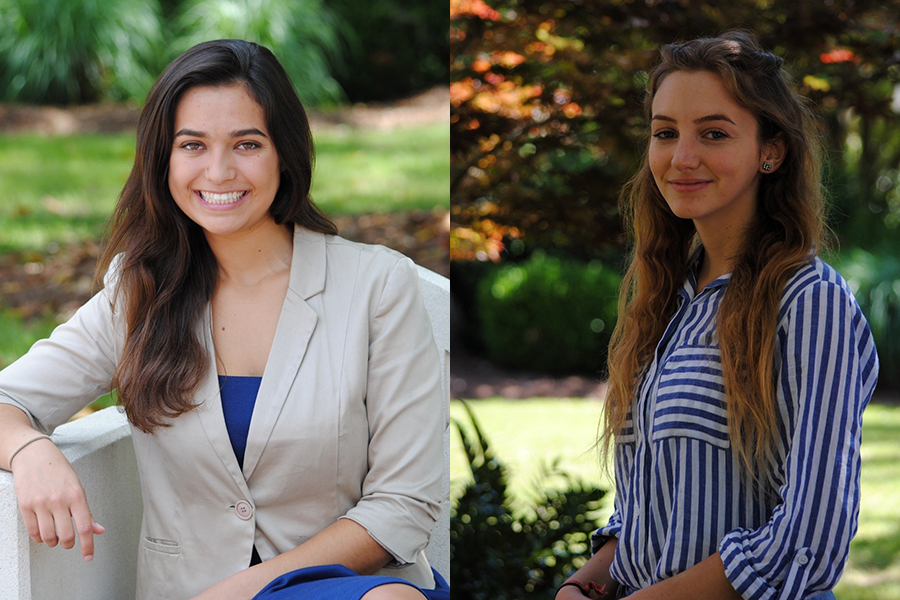
Two Florida State University students were chosen from a competitive pool of national applicants to receive the Ernest F. Hollings Undergraduate Scholarship from the National Ocean and Atmospheric Administration (NOAA).
As Hollings Scholars, FSU rising juniors Jennifer Magi and Anna Wuest will receive awards that include up to $19,000 of academic assistance over two years and a 10-week, full-time paid summer internship at a NOAA research facility of their choosing.
“To have Anna and Jennifer recognized by NOAA with Hollings Scholarships in their second year on campus reflects their phenomenal scholarship and exceptional potential to create a positive impact through research and service,” said Craig Filar, director of National Fellowships at FSU.
Magi, an environmental engineering major from Delray Beach, studies and works to develop creative solutions to some of the world’s most urgent environmental issues. In the past, she’s conducted research aimed at revealing how green technologies like kelp biofuel can be best optimized to make our cities more sustainable.
She said her time as a Hollings Scholar could be an inflection point in her burgeoning career as an environmental engineer.
“I love engineering, problem solving and creating technologies, and I’d like to apply that to solving environmental problems,” Magi said. “I expect that this opportunity with NOAA will help me determine which path I want to take.”
As a new undergraduate with limited experience but boundless ambition, Magi joined the lab of FSU Assistant Professor Angela Knapp in the Department of Earth, Ocean and Atmospheric Science. In Knapp, Magi found a committed mentor eager to foster the interests of her pupils.
“She always told me to do what’s best for me, even if it wasn’t in her lab,” Magi said. “It’s incredible that FSU has so many amazing faculty members who care about you and want you to succeed.”
Knapp said the Hollings program will provide Magi yet another opportunity to explore her interests and refine her already prodigious engineering skillset.
“Jennifer is motivated by the problem-solving approach of engineering to help improve the environment,” Knapp said. “She’s interested in exploring a range of methods to understand the environment, and the Hollings Scholarship will provide her an opportunity to learn about the environment from a perspective that is different from her course and lab work.”
Like Magi, Wuest has established herself as a gifted researcher driven by a clear sense of purpose. When the Port Orange native first enrolled at Florida State, she was sure of two things: She wanted to work with math, and she wanted to explore the fields of environmental and biological research. She just wasn’t sure how to synthesize what felt like irreconcilably divergent disciplines.
She credits an important relationship with former FSU Assistant Professor Leithen M’Gonigle for helping her to distill her interests into the perfect pursuit — computational biology.
“Dr. M’Gonigle was an amazing professor — I didn’t know what computational biology was until I talked to him,” Wuest said. “Even though I was underqualified, he was willing to sit down with me every week, teach me how to code and introduce me to different biological concepts that I wasn’t familiar with. He encouraged me through the learning process, and that was extremely special for me.”
Wuest is now pursuing a degree in biomathematics, where she uses her computational biology training to conduct penetrating research using high-powered math models to make better sense of complex natural processes.
“It’s a great way to circumvent the economic costs of traditional research — it’s all done on computer programs,” she said. “That allows you to expand on existing research in new and interesting ways.”
M’Gonigle, now an assistant professor of terrestrial ecology at Simon Frasier University, said that Wuest’s broad knowledge base and aptitude for quick learning make her a model researcher — and a deserving Hollings Scholar.
“Anna’s ability to master complicated new material quickly is exceptional,” M’Gonigle said. “She came to work with me after just one year of university coursework, and in almost no time she was developing and analyzing her own code as she investigated foundational questions in theoretical evolutionary biology.”
Both Magi and Wuest said Florida State’s Undergraduate Research Opportunity Program (UROP) was instrumental in priming them for an opportunity like the Hollings Scholarship. Early exposure to rigorous research environments, they said, proved fundamental to their academic and professional development.
“The fact that FSU allows undergraduates to engage in research immediately through the UROP program was really pivotal in my interest in doing research,” Wuest said. “Learning those skills so early on in my undergraduate career was important in helping me decide what I wanted to do and why.”
Added Magi: “The UROP program here is so incredible. They allow you to jump right in on your first day of college — you’re in a lab meeting professors and mentors right away. At other universities, you may not be able to get in a lab until your junior year. I never expected to find myself in a lab, but I became super passionate about research through UROP.”
The Hollings Scholarship was established in 2005 in honor of Senator Ernest F. Hollings — a strong supporter of ocean policy and conservation. Applications for the 2019 scholarship class will open in September. To learn more about the program, click here.
For more information on national scholarships, visit the Office of National Fellowships at http://onf.fsu.edu/.




